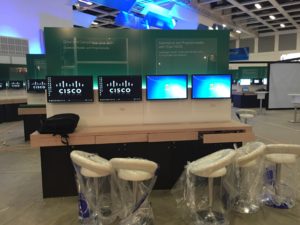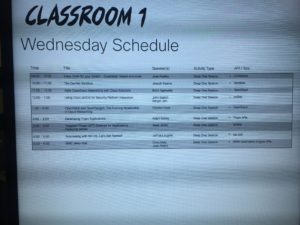Getting a session at Cisco Live is not a given, even for a Principal TME. I started at Cisco in October 2015, and I certainly didn’t expect to present at, or even go to, Cisco Live Berlin in January 2016. Normally, there are three ways to secure a session at CL:
- Submit an idea during the “Call for papers” process about six months before a given event. The Session Group Managers (SGMs) who manage individual tracks (e.g., security, data center) then must approve it. It can be hard to get that approval. SGMs need to have faith in your ability as a presenter, as well as believe your topic is relevant and unique.
- Carry over a session from the previous CL. If you’ve presented a session, you can check a box in the Cisco Live management tool to ask for it to be carried over to the next CL. Again, this is dependent on the SGMs approving it.
- Be handed a session by somebody who had it approved, but is not going to present it. Perhaps they are leaving, taking a new job, or just don’t want to do it any more. Usually the SGMs need to approve any re-assignments as well. (You can see the SGMs are rather powerful for CL. It helps to know them well, and it hurts when they turn over!)
When I joined Cisco, I was assigned to a wonderful and humble team working on programmability. We met and discussed the various assignments and approvals we had for Cisco Live, and they kindly offered my two: booth duty for an Ansible with Nexus demo, and a session at DevNet called “Automation with NXOS: Let’s get started!”
A Principal TME is a director-level position, and normally a PTME would not be expected to spend all day at a booth. However, since I was new to the company, position, and team, I decided it would be a good idea to do some of the grunt work a normal TME does, and experience booth duty.

My 2016 Berlin CL Booth before opening
As for the DevNet session: DevNet, Cisco’s developer enablement team, runs a large section of the Cisco Live show floor. DevNet has theaters which are open-seating and divided from the rest of the show floor. A typical CL breakout takes place in a room, whereas DevNet sessions are out in the open. In 2016, it was pretty easy to get DevNet sessions, and nobody cared when the team re-assigned it to me. I had a free trip to Europe and plenty to do when I got there.
What you see at Cisco Live is the fruit of months of preparation. I had to develop the entire booth demo from scratch–I was supposed to have help from another TME from a different team, but he was totally worthless. I set up the lab and wrote the demo script myself. For the DevNet session, I pulled together slides from my colleagues and did my best to master them. Keep in mind, I came to Cisco after six years at Juniper. I didn’t know a thing about Nexus, and programmability was new to me.
Every new speaker at CL is required to undergo speaker training, so I signed up for mine. In 1 hour the non-technical trainer gave me a few pointers. I’ve been through enough speaker training in the past that it wasn’t terribly helpful, but the box was checked.
Arriving in Berlin, I registered at CL and as a speaker and staffer was given an “all-access” pass. I could go anywhere at the show. Personally, I’ve always loved having backstage access to anything, and so I headed to the World of Solutions (WoS, the show floor) and spent a long time trying to find my booth. WoS before it opens is a genuine mess–people running cherry-pickers and forklifts, laying down carpet, and well-dressed booth people all contending for space. There are usually challenges getting the demo computers up and running, connected to demos back home, etc.

WoS is a mess when we arrive
Working a booth can be frenetic or boring. The positioning of my booth and the content of the demo (Ansible automation of NXOS) did not generate a lot of traffic. I spent hours standing at the booth with nothing to do. For the occasional customer who would show an interest, I’d run the demo, and possibly do a little white boarding. Then, reset the demo and wait for the next guy. It wasn’t a lot of fun.
Eventually, the time came for the DevNet session. I was really nervous for my first time in front of a CL audience. Would I mess up? Would I choke up due to nerves? Would my audience ask questions I couldn’t answer?

Seeing your own name on the board is exciting and nerve-wracking
As I said, the DevNet sessions are presented out on the show floor, and it’s a terrible speaking environment. It’s noisy, you cannot hear yourself, and the participants were given headphones so they could hear. It was like speaking into a void. I remember one gentleman bouncing between sleep and wakefulness, his head nodding down and then coming alive again. The presentation was not one of my best, but I got the job done acceptably and the participants filled out their paper score sheets at the end. I mostly had 5’s, and a few 4’s. At that point DevNet sessions did not receive an official score, so my numbers didn’t “count”, but I could show them to my boss and get some credit, at least.
My wife had traveled with me and we took a few sightseeing trips. We saw the amazing museums on Berlin’s “museum island” and also hired a driver to give us a tour. We had several team events around the city–Cisco Live is famous for parties–and ate some very good German food. One of my colleagues was well known for arranging parties that went until four or five AM, and many TMEs would show up to their 8am session with only a couple hours of sleep. In fact, one of the other Hall of Fame Distinguished Speakers claims this was his secret to success! I myself, avoid parties like that and spend hours in my room practicing my presentation before giving it. To each his own, I suppose.

Ah, the perks of Cisco Live!
Network engineers are a breed unto ourselves, and I think we have a distinct feeling of community. Our field is highly specialized, and because we often have to defend our domain from those who do not understand it (“it’s not the network, ok?!”), we have a camaraderie that’s hard to match. I left Berlin on a real high, feeling more a part of that community than ever having been there in a Cisco uniform, and having gotten up in front of an audience. I didn’t know what my future held at Cisco, but it was the first of many such experiences to come.



